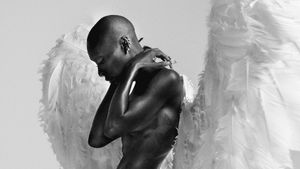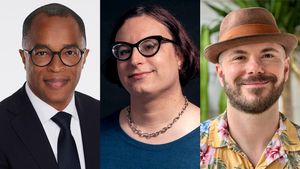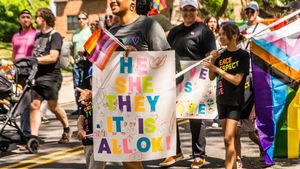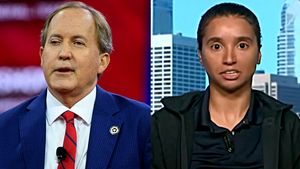We love us some She-Ra!
![]()
Ever since Dreamworks Animation's reboot of the classic '80s cartoon series premiered last fall on Netflix, we've been obsessed with the beautiful, colorful animation, the empowering, badass squad of princesses, and of course, the positive portrayal of queer people (especially women) that you don't see very often in children's programming. The show just exudes big, gay energy, and while season 1 was captivating in all the best ways, we've been anxious to see how the creators will keep the momentum going for season 2!
PRIDE got the chance to chat with Noelle Stevenson, the executive producer and showrunner of She-Ra and the Princesses of Power, to talk about what's in store for our fave Etherians, why she thinks everyone stans Catradora, and what's next for the series!
PRIDE: In season 1 we obviously see a lot of set-up for Adora as She-Ra, but now that we've been introduced to the cast and the universe and now that we know the characters, in season 2, we get to see a lot more of both the other princesses and The Horde. How fun was it to get to write more of those other characters and their stories?
Noelle Stevenson: It's so much fun and it's something that we always wanted to do with the show. This is a collaborative ensemble show, and it is so much about not just Adora and Catra, but also all of the other princesses and how they all come together. So, most of season 1 was just setting it up, getting the characters into place. So having the Princess Alliance come together, having Adora take on the role of She-Ra, having Catra start to move up the ladder in The Horde and take her place as a villain. So this season is the start of us being able to really do some really cool stuff with the characters, experiment with format, and highlight new, interesting combinations of characters that we might not have thought about at first, and just really get an idea of how all these characters think, what their motivations are, and how they all kind of work together.
Fun question! Putting aside good and evil, whose squad would you want to be a part of, Catra's or Adora's?
Oh, man. You can't ask me that. I can't choose favorites. I love all my children equally. However, you know I'm obsessed about the villains, so that's all I'll say about that.
So this season, we get to see the Princess Alliance fully formed and functional. Can you talk about the impact of seeing a squad of women come together and that the viewers really look up to? I feel like the world needs more girl squads kicking butt and saving the day, especially in Western media.
I really love exploring the themes of friendship, but a lot of time I would find that we weren't as much taking a look at how hard friendship could be too. Even when you're really young I think every kid is sort of been through the experience of 'Oh, I'm fighting with my friend, what's going on? We're growing apart, we're not working together as well as I thought we would or as well as we should.' I really wanted to explore what it meant to be a friend and how to work together as a team in a way that took it a little bit beyond 'teamwork is good, friendship is good,' and kind of really get into what happens when friendship is hard, and what happens when teamwork is hard.
This show is about how it's always worth it to work together and to be collaborative with the people around you, but it's not always easy, it doesn't always come naturally, but it's still worth doing. All of the characters have a relationship with that in one way or another. We wanted to explore it in as many ways as possible because as people who are making a show it's also what rings very true for us because making the show was one of the most collaborative things you can do. You have to really depend on the people around you to make it happen. And that's not always easy, sometimes it takes it takes a lot of communication and a lot of hard work. You have to figure out how to get past misunderstandings and all kinds of things that come with that, but it makes the final product so much stronger. It's so much stronger than any one person trying to do it all themselves.
![]()
I know you can't give away too many plot details, but throughout the series, and especially in this upcoming season, Adora really starts to come into her own and kind of struggle with her new identity as She-Ra, as a hero, and as a leader. The message I get out of the show is that identity is this constantly-changing journey. Can you talk a little bit about that and why it's important for audiences, especially queer audiences, to hear a message like that?
I think that's a huge part of the show, that the characters are trying to figure out who they are, and who they want to be, and what roles they want to inhabit. A lot of that is in spite of the messages that they were given by their authority figures. We sort of see that playing out with Angella, and Shadow Weaver, and Light Hope, and all of these other characters who influenced Adora, and the other characters in some way.
The show is about finding your own way. Adora makes a huge choice in season 1 to leave behind everything that she knows to try and do what she thinks is right. And her way of looking at the world completely changes the more of it that she sees. And I think that is something that really, for me, was really personal, and that was something that was really important to be the kind of show that there's this huge world out there full of so many possibilities. You can figure out how you are a part of the world that's around you. And you don't have to necessarily accept the path that some other person puts in front of you. I think all of the characters deal with that in some way or another. Some of them are more obvious than others. Some characters like Catra have a really long way to go towards finding an expression of themself that is true and also positive for them because they're reacting so much to other characters who've influenced them. It's something that all the characters are always working towards. I really hope that as a part of the show, especially with the queer scenes, we can just show that there are all of these different ways to be, all of these different ways to express yourself. All of those things are valuable, and positive, and all of those ways are the right way to be.
![]()
Catra and Adora were already pretty obsessed with each other in season 1, but for this season it's ramped up even more, and I didn't even think that was possible! Can you talk more about their continuously changing dynamic?
I think in season 1, I don't think they really took their roles quite as seriously. Adora had sort-of decided what she was going to do, but I don't think Catra was very committed to being the villain. She was playing the part but her heart wasn't really in it. She was just sort of, you know, she was supposed to be focused on getting Adora back. And she sort of thought that things could go back to this status quo that they had before. But then at the end of that season Catra realized that no, she didn't want things to go back to that status quo and not only that she thought that she could make it farther as a villain than anyone had ever expected, and she wanted to prove that. Both of them have had a really big change from last season to this season where now Catra is more of a legitimate villain in a way that I don't think Adora ever expected her to be. And that really threw Adora for a loop. She's trying to grow passed Adora, she's trying to prove that she doesn't need Adora. And Adora is sort of more hung-up on Catra than ever because she's like, 'How could this happen? How could this person that I know better than anyone in the world be this villain and this person who is trying to hurt me?'
I think that their relationship does just continue to evolve in the way, you know, where Catra is trying to pretend that she doesn't need Adora. It always kind of comes back to her as much as she tries to push it away. For both of them, it always kind of comes back to each other.
![]()
Why do you think it is that the fans love about them so much?
A lot of what I can really tell you about them is that in a lot of ways they start out very similar to each other, but with some really big core differences that they don't necessarily notice at first. And then as the story wears on it starts pushing them apart in a way that's kind of really tragic. You don't want them pushed apart, but you kind of realize that there's no other way that this could happen. And just despite everything, despite how much they fight, and sometimes hate each other, and are at each other's throats, and you know, they are on opposites sides, they will never not care about each other. They care more about each other than any girl in the world. I think that most people also relate to that dynamic in some way because we've all sort of felt the pain of being pushed apart from someone that you really care about. And you root them. You root for both of them even when Catra is always making her own choices. You're like, 'Please, just choose to be happy! Could you just choose to be happy?' And you want things to work out for them.
They seem to dominate every scene they're in when they're together. I'm really glad that people are responding so well to them because they are super fun to relate and they're both really close to my heart.
When can we expect to see more of the mythology of the She-Ra universe? When are we going to see even more about Mara, and the origin of She-Ra?
Very soon! We set-up a lot of that in season 2 and we pay it off in the next season, which will be coming pretty soon. So, you're going to get a lot of answers very, very soon!
Season 2 of She-Ra and the Princesses of Power is now streaming on Netflix! Watch the trailer in the video below!




































































































































